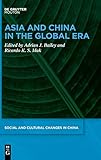Asia and China in the Global Era / ed. by Adrian J. Bailey, Ricardo K. S. Mak.
Material type: TextSeries: Social and Cultural Changes in China [SCCC] ; 1Publisher: Berlin ; Boston : De Gruyter Mouton, [2021]Copyright date: ©2021Description: 1 online resource (XI, 225 p.)Content type:
TextSeries: Social and Cultural Changes in China [SCCC] ; 1Publisher: Berlin ; Boston : De Gruyter Mouton, [2021]Copyright date: ©2021Description: 1 online resource (XI, 225 p.)Content type: - 9781501514890
- 9781501505553
- 9781501505591
- 301
- DS33.4.C5 A853 2021
- online - DeGruyter
- Issued also in print.
| Item type | Current library | Call number | URL | Status | Notes | Barcode | |
|---|---|---|---|---|---|---|---|
 eBook
eBook
|
Biblioteca "Angelicum" Pont. Univ. S.Tommaso d'Aquino Nuvola online | online - DeGruyter (Browse shelf(Opens below)) | Online access | Not for loan (Accesso limitato) | Accesso per gli utenti autorizzati / Access for authorized users | (dgr)9781501505591 |
Frontmatter -- Acknowledgements -- Contents -- List of Figures -- List of Tables -- Chapter 1. China and the global era: From globalisation to everyday life -- Chapter 2. Origin effects, spatial dynamics, and redistribution of foreign direct investment in Guangdong, China -- Chapter 3. Broken wing: Affective geographies of China’s state-owned enterprise reform -- Chapter 4. Neoliberalisation and community development: Comparing community development services in Hong Kong and Beijing -- Chapter 5. A review of the effective features of Facebook in social media-based interventions to increase adolescents’ physical activity -- Chapter 6. Gender and social capital: The case of a deprived urban community in Hong Kong -- Chapter 7. Framing migrant domestic workers inside transnational businesses: A case study of Bangladeshi women travelling to Hong Kong, and their Hong Kong-based employment agencies -- Chapter 8. Aurora College for Women in Shanghai, 1937–1951 -- Chapter 9. The local mutation of professional academic organisations and its fragmentising effect under academic globalisation: Evidence from modern China and Japan -- Chapter 10. German Romantic ideals and the revival of traditional Chinese culture in early twentieth century China -- Chapter 11. Urban resilience in China: Government action and community response -- Index
restricted access online access with authorization star
http://purl.org/coar/access_right/c_16ec
China's strong economic growth occurring alongside modernization across the great majority of Asian societies has created what many see as a transnational space through and by which not only economic, social and cultural resources, but also threats and crises flow over traditional political boundaries. The first section of the work lays out a clear conceptual framework. It draws on arguments about nation no longer being the only container of society, about trans-disciplinary thinking, and about knowledge being context-bound. It identifies and discusses distinctive features of China and Asia in the global era. These include population, urbanization and climate change; the continuing reach of Orientalist shadows; cultural politics of knowledge. It closes by arguing how global studies adds value to existing accounts. The second, and longer, section applies this framework through a series of original empirical case-studies in three areas: migration/poverty/gender; culture/education; well-being. Both the conceptual framework and case-studies are drawn from research presented at HKBU since 2011 under the auspices of the Global Social Sciences Conference Series and supplemented by additional papers.
Issued also in print.
Mode of access: Internet via World Wide Web.
In English.
Description based on online resource; title from PDF title page (publisher's Web site, viewed 25. Jun 2024)


